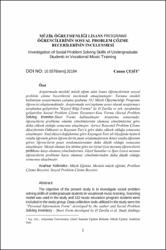| dc.contributor.author | Çeşit, Canan | |
| dc.date.accessioned | 2017-03-23T07:16:04Z | |
| dc.date.available | 2017-03-23T07:16:04Z | |
| dc.date.issued | 2017 | |
| dc.identifier.issn | 2149-4304 | |
| dc.identifier.uri | http://amader.aku.edu.tr/wp-content/uploads/2017/01/c3s5_7-canan-%C3%A7e%C5%9Fit.pdf | |
| dc.identifier.uri | http://hdl.handle.net/11630/4442 | |
| dc.description.abstract | Araştırmada mesleki müzik eğimi alan lisans öğrencilerinin sosyal
problem çözme becerilerini incelemek amaçlanmıştır. Tarama modeli
kullanılan araştırmanın çalışma grubunu 162 Müzik Öğretmenliği Programı
öğrencisi oluşturmaktadır. Araştırmada veri toplama aracı olarak araştırmacı
tarafından geliştirilen "Kişisel Bilgi Formu" ile D’Zurilla ve ark. tarafından
geliştirilen Sosyal Problem Çözme Envanteri-Kısa Formu (Social Problem
Solving Inventor-Short Form) kullanılmıştır. Araştırma sonucunda;
öğrencilerin probleme olumlu yönelimlerinin olumsuz yönelimlerine göre
daha yüksek olduğu sonucuna ulaşılmıştır. Ayrıca Rasyonel Problem Çözme
düzeylerinin Dikkatsiz ve Kaçınan Tarz'a göre daha yüksek olduğu sonucuna
ulaşılmıştır. Sınıf düzeyi değişkenine göre Kaçıngan Tarz alt ölçeğinde üçüncü
sınıfta öğrenim gören öğrencilerin puan ortalamalarının ikinci sınıfta öğrenim
gören öğrencilerin puan ortalamalarından daha düşük olduğu sonucuna
ulaşılmıştır. Mezun olunan lise türüne göre ise Genel Lise mezunu öğrencilerin
probleme karşı olumsuz yönelimlerinin, Güzel Sanatlar ve Spor Lisesi mezunu
öğrencilerin probleme karşı olumsuz yönelimlerinden daha düşük olduğu
sonucuna ulaşılmıştır. | en_US |
| dc.description.abstract | The objective of the present study is to investigate social problem
solving skills of undergraduate students in vocational music training. Scanning
model was used in the study and 162 music education program students were
included in the study group. Data collection tools utilized in the study were the
“Personal Information Form” developed by the author and Social Problem
Solving Inventory – Short Form developed by D’Zurilla et al. Study findings demonstrated that positive orientation of the students were higher than their
negative orientationon the problem. Furthermore, it was found that their
“rational problem solving” levels were higher than “inattentive and avoidant
type.” It was also found that scores of the junior students were lower than
sophomores in “avoidant type” subscale based on the grade level variable.
And based on the type of high school graduated, it was determined that
negative orientation of general high school graduate students were lower than
that of the students who graduated from fine arts and sports high schools. | en_US |
| dc.language.iso | tur | en_US |
| dc.publisher | Afyon Kocatepe Üniversitesi, Akademik Müzik Araştırmaları Dergisi “AMADER” | en_US |
| dc.identifier.doi | 10.5578/amrj.32184 | en_US |
| dc.rights | info:eu-repo/semantics/openAccess | en_US |
| dc.subject | Müzik Eğitimi | en_US |
| dc.subject | Mesleki müzik eğitimi | en_US |
| dc.subject | Problem Çözme Becerisi | en_US |
| dc.subject | Sosyal Problem Çözme Becerisi | en_US |
| dc.title | Müzik öğretmenliği lisans programı öğrencilerinin sosyal problem çözme becerilerinin incelenmesi | en_US |
| dc.title.alternative | Investigation of social problem solving skills of undergraduate students in vocational music training | en_US |
| dc.type | article | en_US |
| dc.relation.journal | Akademik Müzik Araştırmaları Dergisi “AMADER” | en_US |
| dc.department | Afyon Kocatepe Üniversitesi | en_US |
| dc.identifier.volume | 3 | en_US |
| dc.identifier.startpage | 1 | en_US |
| dc.identifier.endpage | 18 | en_US |
| dc.identifier.issue | 5 | en_US |
| dc.relation.publicationcategory | Makale - Ulusal Hakemli Dergi - Kurum Yayını | en_US |



















